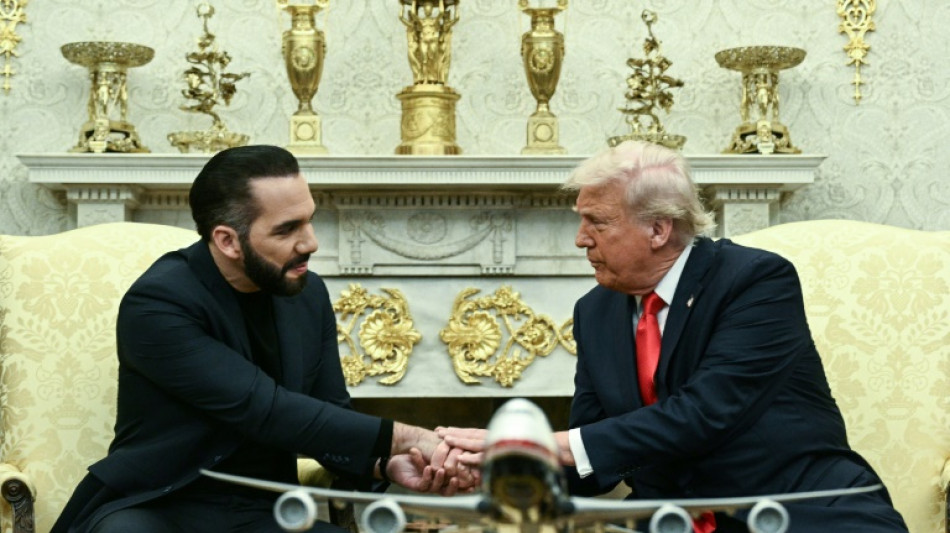
RBGPF
0.1400

El Salvador's President Nayib Bukele assured Donald Trump on Monday that he would not return a man mistakenly deported from the United States, as the pair bonded over Trump's scheme to send migrants to a notorious prison in the Central American country.
Trump gave a warm welcome in the Oval Office to 43-year-old Bukele, the self-proclaimed "world's coolest dictator" who is now the US president's key ally in his controversial push to deport illegal migrants.
But the pair faced questions over the case of a father who was mistakenly deported to the Salvadoran mega-prison -- and whose return a US court has ordered the Trump administration to facilitate.
"Of course, I'm not going to do it," Bukele told reporters when asked if he would send the man, Kilmar Abrego Garcia, back to the United States.
"The question is preposterous.... I don't have the power to return him to the United States."
Trump and Bukele, who wore a dark T-shirt under a suit, spent much of the meeting complimenting each other on their migration and crime policies.
Known for his stylish dress sense and social media savvy, Bukele is broadly popular at home for clamping down on once rampant drug gangs that terrorized El Salvador.
But the Salvadoran leader is accused of overseeing mass human rights violations, epitomized by a huge, brutal prison known as CECOT.
Trump's immigration policies focused on what he says is the threat of a gang-led crime wave in the United States, are meanwhile among his most popular, receiving much higher ratings than on the economy.
"You are helping us out, and we appreciate it," 78-year-old Trump told Bukele.
Trump also reiterated that he was even considering deporting some US citizens who commit violent crimes to El Salvador, saying "I'm all for it" and asking Attorney General Pam Bondi to look into the idea.
- 'Administrative error' -
Trump and Bukele also share a taste for conservative, strongman-style politics. They spent several minutes criticizing the media and then talking about the issue of transgender athletes in women's sports.
Shortly after Trump's inauguration for a second term, Bukele made the extraordinary offer to take in prisoners from the United States, in exchange for a fee of $6 million.
Trump took the Salvadoran leader up on his proposal, sending more than 250 migrants there -- a majority of them under a rarely used wartime law dating to 1798, which stripped the deportees of due process.
Slickly produced footage of their arrival -- including chained and tattooed men having their heads shaved and being frog-marched by masked guards -- was widely promoted by both the Salvadoran and US governments.
The Trump administration contends that the migrants are members of criminal gangs designated by the United States as terrorist organizations, including El Salvador's MS-13 and Venezuela's Tren de Aragua.
However, relatives of several of the men contend they have no connection to organized crime and in some cases had been swept up simply because they had tattoos unrelated to any gang activity.
The expulsion to El Salvador of Abrego Garcia has set off a major legal crisis, after the Trump administration admitted he had been deported in an "administrative error."
A federal judge ordered the government to "facilitate" Abrego Garcia's return to the United States, but Trump officials contend he is now solely in Salvadoran custody, leaving the man in legal limbo.
Despite the partnership, El Salvador was among the dozens of US trade partners that the Trump administration slapped with 10 percent tariffs earlier this month.
The United States is the main destination for Salvadoran exports. Of the nearly $6.5 billion in goods exported from El Salvador in 2024, $2.1 billion went to the United States, including clothing, sugar and coffee, according to the central bank.
But Trump and Bukele also share a fondness for cryptocurrency, with El Salvador becoming the world's first country to establish bitcoin as legal tender in 2021.
I.Horak--TPP